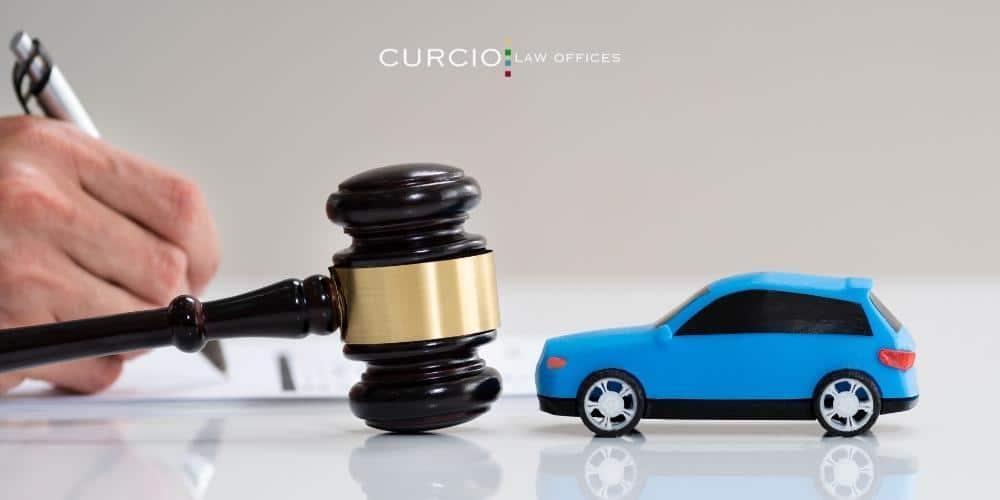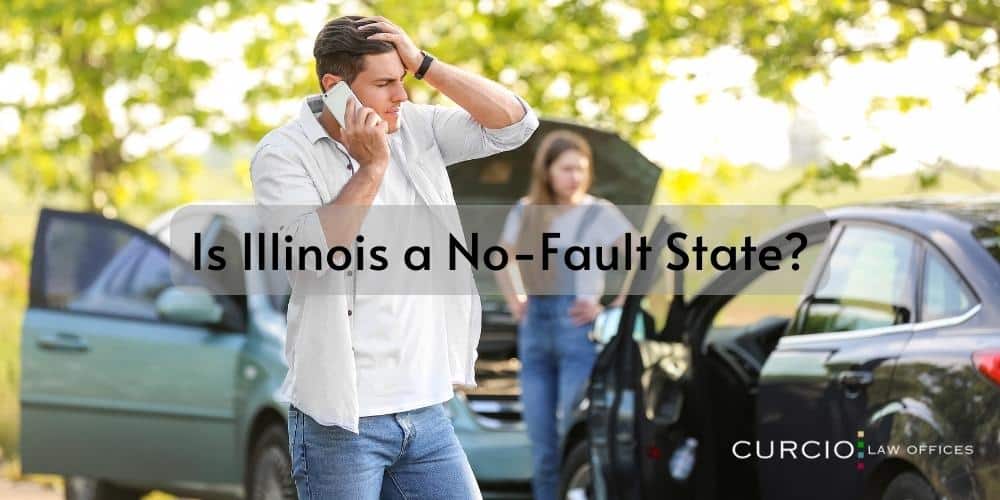In the United States, 12 states are no-fault states, and 38 states are at-fault states when it comes to car accidents. Maybe you’ve just survived a car accident, and you’re looking at your options while wondering: is Illinois a no-fault state? Chicago car accident lawyers at Curcio & Casciato can help you answer these questions and more while also ensuring that you receive the compensation you deserve. Call our law firm today at 312-321-1111 to schedule a free consultation.
What’s the Difference Between a No-Fault State and an At-Fault State?
So, is Illinois a no-fault state? No, Illinois is actually one of 38 states that is an at-fault state. But what’s the difference?
A no-fault accident is one that you didn’t cause. Meanwhile, an at-fault accident is one that you certainly caused. In a no-fault system, injured victims must file a claim with their own insurance company for reimbursement of medical bills and property damages. On the other hand, an at-fault based system requires the at-fault driver’s auto insurance company to cover the damages of everyone involved in the accident.
What is Modified Comparative Negligence in Illinois?
Modified comparative negligence, also called modified comparative fault, is basically a tort law that assigns compensation when two or more drivers in an accident are partially at fault. In Illinois, if you are 51% or more at fault for the accident, you can’t claim compensation for any bodily injury or car repairs.
Other Doctrines of Negligence
Similarly to how states differ on fault rules, many states differ on doctrines of comparative negligence law as well.
- Contributory Negligence: If a car accident is ever so slightly your fault, you can’t sue the other driver, who may also share some of the blame. Five states follow this rule.
- Pure Comparative Negligence: Regardless of who claims the majority of the blame, all drivers are entitled to damages less than their share of the blame. 12 states follow this rule.
- Modified Comparative Negligence – 50% Rule: There are two types of modified comparative negligence: the 50% rule and the 51% rule. As previously stated, Illinois abides by the 51% rule. The 50% rule basically works the same way: you can’t receive any financial recovery if you are more than 50% at fault for a crash. 12 states follow the 50% rule, while 21 states follow the 51% rule.
- Slight vs. Gross Comparative Negligence: You can receive bodily injury or property damage coverage only if you’re “slightly negligent” instead of grossly negligent compared to the other driver.
Proving Fault in a Car Accident in Illinois
In order to prove who is at fault for a car accident in a personal injury lawsuit, an attorney must prove that a driver was negligent. With all types of negligence in Illinois, the injured party’s attorney must prove the 4 D’s of negligence, and they are:
- Duty of Care: All drivers owe each other a duty of care on the roads. In other words, it’s expected for every driver to drive as safely and responsibly as possible.
- Duty Dereliction: One of the drivers involved in the accident violated this expected duty of care.
- Direct Cause: A victim of the accident suffered various injuries and car damages as a result of the at-fault driver violating their duty of care.
- Damages: Compensation may be able to cover some or all of the monetary losses you or other drivers sustained from the accident.
Insurance Requirements for Illinois Drivers
If you are the responsible party, you have to pay for any bodily injuries and car repairs that other drivers sustain. In order to pay for this, all Illinois drivers must have a minimum amount of liability insurance. Listed below are the minimum coverage amounts required in our state.
- $25,000 for injuries or death per person involved in the accident
- $50,000 for total injuries and deaths per accident
- $20,000 for property or car damage per accident
Victims can only receive as much compensation that the at-fault driver’s liability coverage provides. If their injuries and car repairs cost more than what the liability insurance covers, victims can then file a personal injury claim to receive full compensation.

What Should I Do if I Cause a Car Accident in Illinois?
Maybe you’re the at-fault party in a car accident and you know it immediately. Even minor crashes are scary and can leave you shaken up and confused as to what to do next. If you caused an accident, you still need to protect your rights.
Call the Police
Right after an accident happens, you should call the police. Make sure to stay at the crash scene until the police arrive. If you don’t, a court could charge you with a hit and run which will make your situation worse. The police will write up a report on the crash and make sure everyone involved is okay. Additionally, police may write you a ticket if you clearly caused the accident.
Exchange Information
Secondly, you should exchange information with the other party involved in the crash. Here is the basic information that you should write down:
- Names
- Phone numbers
- Insurance company information
- License plate numbers
- Vehicle makes and models
Stay Calm and Don’t Reveal Too Much Information
It’s natural to feel shaken up after an accident, especially if you believe that it was your fault. All of this adrenaline can cause you to say the wrong things and possibly make your situation worse. Even if the other driver displays obvious anger towards you, you should never admit or hint that the crash was your fault. You should stay calm and avoid doing this after a crash:
- Talking about what you were doing right before the crash. This may include texting while driving, drunk driving, taking your hands off the wheel, talking to a passenger, etc.
- Discussing with police or the other driver(s) who you think caused the crash
- Apologizing or saying anything that may indicate that you caused the crash
- Talking with the other driver(s) about what they were doing before the crash to potentially pick out their mistakes
Notify Your Insurance Company
Lastly, if you’re at-fault for an accident, you should call your insurance company as soon as you can. If you wait too long to notify your insurance company about the accident, it’s possible that you won’t receive coverage.
Will My Car Insurance Rates Increase if I Caused a Car Accident?
As explained previously, Illinois follows the 51% rule. If you are more than 51% responsible for the accident, your insurance rates will likely go up when you renew your policy. But all car insurance requirements and policies are different, so the best way to know for sure is to call. Additionally, some insurance policies will even offer “accident forgiveness” as long as you go a specific amount of time without causing another accident. If you paid for accident forgiveness ahead of the crash, you can potentially utilize those benefits.
What Types of Damages Can I Claim if I’m At-Fault for an Accident in Illinois?
As long as you are less than 51% responsible for a car crash in Illinois, you can still receive compensation. You can potentially receive economic and non-economic damages.
Economic Damages
Economic damages are basically monetary losses incurred as a result of your accident. Some of the most common types of economic damages are:
- All medical bills including doctor visits, scans, procedures, treatments, medication, etc.
- Physical therapy and rehabilitation after the accident
- Future medical treatment related to the crash, if applicable
- Property damage
- Lost income
But in order to recover economic damages from your personal injury case, your Chicago car accident lawyer must establish that the accident caused all monetary losses.
Non-Economic Damages
Non-economic damages, on the other hand, are those that don’t have a set financial value. Some of the most common types of non-economic damages are:
- Physical pain and suffering
- Mental suffering
- Loss of enjoyment in daily life
- Loss of consortium
How Do I Seek Compensation for a Car Accident in Illinois?
If this is your first car accident, you may be wondering how to seek compensation even if you’re partially to blame. There are three legal options to obtain damages after a car accident in Illinois:
- File a first party claim with your insurance company
- File a third party claim with the at-fault driver’s insurance company, if applicable
- Sue the negligent driver in civil court
Illinois Statute of Limitations for Car Accidents
If you want to receive compensation for your injuries or property damages following an accident, you can do so by filing car accident claims and lawsuits within a specific time frame. In Illinois, you have two years from the date of your accident to receive compensation for your injuries. However when it comes to property damage, you have five years from the date of your accident to receive compensation.

Call Chicago Car Accident Lawyers at Curcio & Casciato Today
If you’re fully at fault, partially at fault, or unsure if you’re at fault, it’s important to have an experienced Illinois personal injury lawyer on your side. The legal team at Curcio Law has extensive knowledge of both Illinois law and insurance laws in relation to car accident cases. We can answer all of your questions including: is Illinois a no fault state? We can also determine how much of the car accident was your fault, help you win the compensation you deserve, and make sure you don’t pay an unfair settlement to the other driver. Call a Chicago car accident lawyer today at 312-321-1111 for a free consultation.



